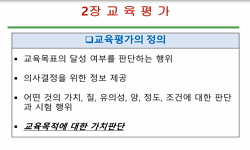우리나라의 책임운영기관제도와 재정성과관리제도는 도입 후 15년이 경과하는 동안 상호 연계성이 미흡한 상태로 운영되어 왔다. 특히, 책임운영기관은 기관장에게 재정상 자율성을 부여하...
http://chineseinput.net/에서 pinyin(병음)방식으로 중국어를 변환할 수 있습니다.
변환된 중국어를 복사하여 사용하시면 됩니다.
- 中文 을 입력하시려면 zhongwen을 입력하시고 space를누르시면됩니다.
- 北京 을 입력하시려면 beijing을 입력하시고 space를 누르시면 됩니다.

책임운영기관 성과평가에 대한 메타평가 모델 설계 연구 = An Exploratory Study for Designing a Normative Model of Meta-Evaluation on the Performance Evaluation on Executive Agencies in terms of Financial Performance Management
한글로보기https://www.riss.kr/link?id=A100027298
- 저자
- 발행기관
- 학술지명
- 권호사항
-
발행연도
2014
-
작성언어
Korean
- 주제어
-
등재정보
KCI등재
-
자료형태
학술저널
-
수록면
181-220(40쪽)
- 제공처
-
0
상세조회 -
0
다운로드
부가정보
국문 초록 (Abstract)
우리나라의 책임운영기관제도와 재정성과관리제도는 도입 후 15년이 경과하는 동안 상호 연계성이 미흡한 상태로 운영되어 왔다. 특히, 책임운영기관은 기관장에게 재정상 자율성을 부여하되 그 운영 성과에 대하여는 책임을 지도록 하고 있으므로 재정운영에 대한 성과관리도 일반 행정기관보다 강화될 필요가 있음에도 불구하고 성과평가 부문에서는 연계성이 거의 없는 실정이다. 이와 같은 배경에 따라 본 연구는 책임운영기관에 대한 유용하고 정확한 성과정보 생산을 위하여 체제론적 시각에서 재정성과관리 관점이 반영된 메타평가(meta-evaluation) 모형을 개발하여 제시하였다. 아울러, 제시된 메타평가 모형을 활용하여 대전 및 인근지역에 위치한 6개 책임운영기관에 근무하고 있는 성과평가 및 재정관리에 경험을 갖고 있는 소속 공무원 30명을 대상으로 초점면접(Focus Interview) 및 설문조사를 실시하였다. 실태조사 결과, 첫째, 평가환경면에서 책임운영기관 법제에 재정성과관리 관점이 반영되어 있지 않았고, 기획재정부 등 재정성과 관리기관들의 책임운영기관 성과평가에의 참여는 미흡했으며, 책임운영기관 성과평가의 시기와 재정성과관리제도 평가시기가 일치되지 않아 서로간의 연계 활용도가 낮은 것으로 나타났다. 둘째, 평가투입면에서는 책임운영기관 성과평가기구의 재정성과관리 관련 전문성은 부족하였고, 재정성과관리 실적이 평가자료로 제출되고 있지 않았으며, 책임운영기관의 사업계획서와 성과계획서의 구성 및 평가지표의 불일치 현상이 큰 편이었다. 셋째, 평가수행에 있어서는 평가기구가 책임운영기관의 재정성과관리 실적을 평가에 제대로 반영하고 있지 않았으며, 책임운영기관 사업계획서에 재정성과관리 평가지표의 규모 및 가중치가 매우 미미하였고, 책임운영기관 성과평가 업무와 예?결산 업무가 단일하게 관리되고 있지 않고 있었으며, 책임운영기관 성과평가에서 예?결산자료, 성과계획서 및 보고서의 활용도가 낮은 편이었다. 넷째, 책임운영기관의 평가보고서에 재정성과관리 실적이 제대로 반영되고 있지 않았고 성과평가 결과가 다음년도 예산편성 및 성과계획서 수립에도 잘 반영되고 있지 않았다. 본 연구는 이와 같은 문제점들을 해결하기 위한 정책적 방안으로 3가지를 제시하였는데, 첫째, 책임운영성과평가에 재정성과관리 요소를 포함하도록 법제화할 필요가 있으며, 둘째, 책임운영기관 사업계획서에 성과계획서를 반영하는 체계를 마련하고, 셋째, 책임운영기관의 예산편성?운영의 자율성 확대와 재정성과와 예산과의 연계를 강화해야 할 것으로 판단되었다.
다국어 초록 (Multilingual Abstract)
Both the executive agency system and the financial performance management system in South Korea have been operating in the state of low degree of interconnectedness since 1999. In particular, the head of the executive agency has autonomy in the financ...
Both the executive agency system and the financial performance management system in South Korea have been operating in the state of low degree of interconnectedness since 1999. In particular, the head of the executive agency has autonomy in the financial management and so also takes responsibility for its financial operations. In comparison with the general administrative institutions, an executive agency is needed to be more managed in the financial views, but there is nearly no connectivity between two systems in the context of evaluation on the performance of an executive agency. Based on the background as above, this study developed a meta-evaluation model, which represents a financial performance management view, via the systematic approach, especially consisting of environment, input, process, output and feedback factors. Based on this normative model of meta-evaluation, this study also conducted a Focus Interview (FI) targeting 30 public officials belonging to 6 executive agencies in Daejeon City and its vicinity. The main findings of FI are: (ⅰ) that the financial performance management view has not been reflected in laws and systems related to executive agencies; (ⅱ) that evaluation bodies have lacked expertises for financial performance management; (ⅲ) that the results of financial performance management have not been effectively used in the evaluations on executive agencies; and that performance information and data from the evaluations have not properly been utilized in the compilation of budget and annual performance plans for the next years. Accordingly, this study also suggests that a strategic system for evaluating the performance of the executive agencies based on a financial performance management view can be effectively developed by integrating three institutional elements: (ⅰ) building up legal foundation for performance evaluation based on the factors of financial performance management; (ⅱ) establishing a system aligning performance plan with program activity plan; and (ⅲ) enlarging the degree of autonomy in the operation of executive agencies and also strengthening the linkage between funding requests and financial performance of them.
목차 (Table of Contents)
- 국문초록
- Ⅰ. 서론
- Ⅱ. 책임운영기관의 평가 및 메타평가에 관한 선행연구
- Ⅲ. 한국의 책임운영기관제도 및 그 성과평가에 대한 현황
- Ⅳ. 책임운영기관 성과평가에 대한 메타평가 모형 설계를 위한 재정성과관리의 제도적 시각
- 국문초록
- Ⅰ. 서론
- Ⅱ. 책임운영기관의 평가 및 메타평가에 관한 선행연구
- Ⅲ. 한국의 책임운영기관제도 및 그 성과평가에 대한 현황
- Ⅳ. 책임운영기관 성과평가에 대한 메타평가 모형 설계를 위한 재정성과관리의 제도적 시각
- Ⅴ. 연구설계
- Ⅵ. 분석결과
- Ⅶ. 결론 및 정책적 제언
- 참고문헌
- Abstract
동일학술지(권/호) 다른 논문
-
- 한국정치정보학회
- 유호근(Yoo, Ho-keun)
- 2014
- KCI등재
-
- 한국정치정보학회
- 김학성(Kim, Hak-Sung)
- 2014
- KCI등재
-
- 한국정치정보학회
- 주미영(Ju, Meeyoung)
- 2014
- KCI등재
-
- 한국정치정보학회
- 채재병(Chae, Jae Byung)
- 2014
- KCI등재





 DBpia
DBpia






